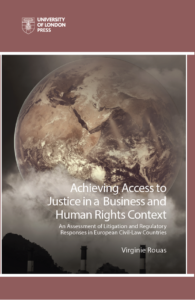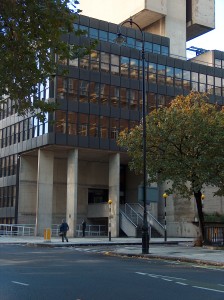By Dr. Virginie Rouas, Legal Advisor at Milieu and Research Associate at the School of Oriental and African Studies, University of London, author of the forthcoming Open Access title Achieving Access to Justice in a Business and Human Rights Context
On 26 May 2021, the District Court in The Hague, in the Netherlands, delivered a landmark ruling in Milieudefensie v RDS, the high-profile climate change litigation case against Shell, an Anglo-Dutch oil corporate group. The court ruled that Royal Dutch Shell (RDS), Shell’s parent company, must reduce CO2 emissions from Shell’s activities by 45% (net) by the end of 2030 compared to its emissions in 2019 through the Shell group’s corporate policy. The District Court’s decision in Milieudefensie v RDS has gotten a lot of attention because it is the first time a court has determined that a non-State actor, in this case a corporation, has an obligation to reduce CO2 emissions.
Aside from its significance in the fight against climate change, this ruling is also noteworthy for its contribution to the advancement of corporate accountability. In a nutshell, the District Court found that, under Dutch tort law, a company owes a duty of care to Dutch residents and the inhabitants of the Wadden region to mitigate climate change, and that this duty extends across its group’s value chain. In this post, I will discuss this aspect of the ruling and how it might affect human rights and environmental cases against transnational corporations (TNCs).
At the crossroads between climate change and corporate accountability
Milieudefensie v RDS is at the crossroads of two prominent and ongoing types of strategic litigation. On the one hand, this case is part of a global trend of climate change litigation aimed at compelling States and non-State actors to mitigate climate change or holding them accountable for their inaction. It is not the first time that the District Court in The Hague has ruled on a climate change-related case. In 2015, in the landmark Urgenda v The Netherlands case, the District Court held that the Dutch government must reduce greenhouse gas emissions by at least 25% by the end of 2020 (compared to 1990 levels). This ruling was upheld by the Dutch Supreme Court, the country’s highest court, in 2019.
On the other hand, Milieudefensie v RDS is one of the various lawsuits filed in the home countries of TNCs to hold them accountable for human rights violations and environmental damage caused by their group operations. This type of lawsuit generally faces numerous procedural and legal challenges, including establishing jurisdiction and asserting the parent company’s liability. In the Netherlands, RDS has been the subject of several civil claims for the environmental and human rights consequences of its Nigerian subsidiary’s oil operations. In one of those claims, the Court of Appeal of The Hague ruled in January 2021 that Shell’s Nigerian subsidiary was liable for damage caused by oil spills in the Niger Delta. While rejecting RDS’s liability for the oil pollution, the Court of Appeal determined that RDS still owed a limited duty of care to people living near Shell’s pipelines in Nigeria.
The District Court’s ruling in Milieudefensie v RDS builds upon these two types of litigation and brings together separate legal issues previously discussed by Dutch courts, namely climate change mitigation obligations in the context of corporate group activities.
Holding TNCs accountable under Dutch tort law
The plaintiffs in Milieudefensie v RDS contended that RDS owes an obligation, under the unwritten standard of care enshrined in Book 6 Section 162 of the Dutch Civil Code, to contribute to the prevention of dangerous climate change through the corporate policy it establishes for the Shell group. Book 6 Section 162 of the Dutch Civil Code establishes a general rule on fault-based liability under which both natural and legal persons can be held liable for their own intentional or negligent conduct. Accordingly, a person who commits an unlawful act against another, which can be imputed to the tortfeasor, must compensate the other for the harm caused. In general, unlawful acts can result from a violation of three types of norms: 1) a right; 2) a statutory duty; and 3) what is customary in society according to unwritten law. The plaintiffs’ claim was based on the third type of norm.
The District Court followed the plaintiffs’ reasoning and held that:
RDS’ reduction obligation ensues from the unwritten standard of care laid down in Book 6 Section 162 Dutch Civil Code, which means that acting in conflict with what is generally accepted according to unwritten law is unlawful. From this standard of care ensues that when determining the Shell group’s corporate policy, RDS must observe the due care exercised in society. (para. 4.4.1)
Therefore, RDS has a tort-based duty of care not to violate an unwritten standard of care, obliging it to take steps to prevent climate change. Furthermore, RDS’ duty extends across the entire corporate group’s policy. This interpretation of Book 6 Section 162 of the Dutch Civil Code is significant. First, it demonstrates that general Dutch tort law can be used to hold companies accountable for their environmental wrongdoings. Importantly, this ruling confirms that Dutch tort law can be used to hold a parent company liable for damages resulting from the activities of its corporate group. Furthermore, by requiring RDS to reduce its CO2 emissions, and thus take action upstream, it demonstrates general tort law’s preventive potential.
Another significant aspect of this ruling is the factors considered by the District Court in interpreting the unwritten standard of care, meaning ‘what may be expected of RDS under this standard with respect to Dutch residents and the inhabitants of Wadden region’ (para 4.4.3). The court took into account various ‘circumstances’, including circumstantial factors (i.e., the Shell group’s CO2 emissions or the consequences of the CO2 emissions for the Netherlands and the Wadden region), human rights (i.e., the right to life and the right to respect for private and family life), and soft-law endorsed by RDS (i.e., the UN Guiding Principles of Business and Human Rights (UNGPs)).
It is worth noting the District Court’s analysis of the UNGPs in its interpretation of the unwritten standard of care. Whether companies have specific obligations towards human rights has been a recurring question in policy and law-making, as well in the courtrooms, over the past decades. The UNGPs, the current authoritative policy document on business and human rights, formulate the corporate responsibility to respect human rights, which recognises that business enterprises should (rather than ‘must’) respect human rights. Similarly, other well-known soft-law instruments addressing the relationship between companies and human rights have suggested potential actions for companies to take to respect human rights without establishing an express obligation or duty to do so. However, here, the District Court interpreted that it ‘can be deduced from the UNGP and other soft law instruments that it is universally endorsed that companies must respect human rights’ (para. 4.4.14) (emphasis added by author). It also mentioned companies’ ‘duty to respect human rights’ (para. 4.4.17). The District Court seems to suggest that companies have human rights obligations. This is a significant departure from the concept of corporate responsibility to respect human rights, which does not articulate a legally-binding obligation to do so.
Despite its findings, the court’s interpretation should be treated with caution. First, when discussing the corporate responsibility to respect under the UNGPs, the court interchangeably uses the terms ‘must’ and ‘should’, as well as ‘duty’ and ‘responsibility’. However, these two terms imply different levels of enforceability (legally-binding obligation vs. voluntary endeavour). Furthermore, the court held that the right to life and the right to respect for private and family life apply in relationships between States and citizens, and that the plaintiffs could not directly invoke these human rights with respect to RDS (para 4.4.9). This contradicts the notion that companies must respect human rights. To add to the confusion, in the end, the District Court factored those ‘human rights and the value they embody in its interpretation of the unwritten standard of care’ because, ‘due to the fundamental interest of human rights and the value for society as a whole they embody, the human rights may play a role in the relationship between [the plaintiffs] and RDS’ (para. 4.4.9).
Finally, it is important to note that the District Court interpreted that RDS has an obligation to reduce CO2 emissions in relation to itself, Shell’s other companies as well as Shell’s business relationships. However, it distinguished RDS’s obligations in each of these situations. On the one hand, ‘[d]ue to the policy-setting influence RDS has over the companies in the Shell group, it bears the same responsibility for these business relations as for its own activities. The far-reaching control and influence of RDS over the Shell group means that RDS’ reduction obligation must be an obligation of result for emissions connected to own activities of the Shell group’ (para. 4.4.23) (emphasis added by author). This is significant because the District Court explicitly acknowledged that RDS has an obligation of result to reduce its emissions, as well as the emissions of the entities within its corporate group, as a result of its control and influence. However, for ‘the business relations of the Shell group, including the end-users’, RDS has a ‘significant best-efforts obligation’, meaning it ‘may be expected to take the necessary steps to remove or prevent the serious risks ensuing from the CO2 emissions generated by them, and to use its influence to limit any lasting consequences as much as possible’ (para. 4.4.24) (emphasis added by author).
Potential impacts
Milieudefensie v RDS may have ramifications for lawsuits against parent companies for human rights and environmental violations committed in the course of group activities. It demonstrates that Dutch tort law is a legitimate and effective tool for holding corporations accountable for human rights and environmental violations, potentially opening the door to similar lawsuits. It also shows that courts are increasingly inclined to hold parent companies liable for damage caused by their subsidiaries and, to a lesser extent, business relationships. However, the application of the Rome II Regulation, which governs the applicable law in cross-border civil disputes, limits the application of Dutch tort law to cases in the Netherlands against TNCs. Indeed, this regulation requires the application of the law of the place of the damage, i.e., the law of the host country. Dutch tort law can only be applied in exceptional circumstances, such as when there is environmental damage, as was the case here.
On 20 July 2021, RDS confirmed that it will appeal the ruling, which means that superior courts will decide on the approach taken by the District Court, with the risk of overturning the ruling. However, RDS is not off the hook. The District Court has made its decision provisionally enforceable, which means RDS must fulfil its obligations while the case is being appealed. As a result, the case against Shell is far from over. It will continue in a context where a growing number of courts around the world are recognizing the climate obligations of States and non-state actors and increasingly holding TNCs accountable for their irresponsible business practices.
NOW Published
IALS are pleased to announce the 2022 publication, as part of the OBserving Law Open Access book series, a book by Dr Virginie Rouas, the winner of the IALS PhD Thesis Book Prize.


